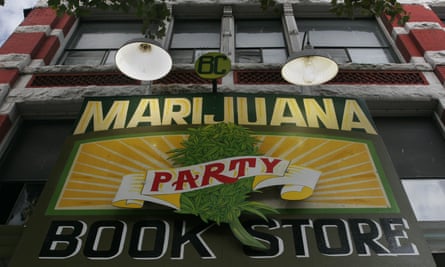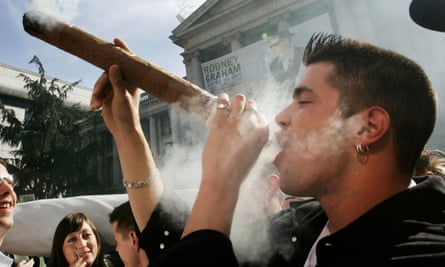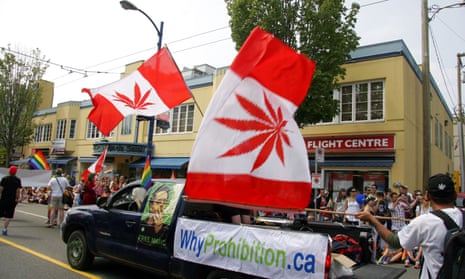When Blair Longley considers Canada’s looming plans to reform its marijuana laws, it is with a degree of trepidation.
He is not among those who worry about the impact of drugged driving or the risks for mental health, however.
Since 2004, Longley has led Canada’s Marijuana party – whose raison d’être is now complicated by the fact that the country is poised to become the first G7 member state to fully legalise the drug.
Now he fears that – like the UK Independence Party after the Brexit vote – his party may struggled to find a purpose after winning the very battle it was established to fight.
“It will just get harder and harder for us to survive,” said Longley. “A lot of people will think: ‘What are you doing? It’s already legal.’”
The federal government has said that legal recreational marijuana could become a reality in Canada by late August of this year, making Canada the second country in the world to legalise the drug, after Uruguay. Medical marijuana is already legal in Canada.
Longley has little doubt, however, that his party would continue to exist, seeking political opportunity in the way legalisation is rolled out. “In every possible way, what they’re doing is nothing like anything that we campaigned for,” he said. “There’s this slight bit of progress, but when you look at the bigger picture, it’s nothing close to what we would want.”
New rules being rushed out across the country mean that once legalisation is in place, some will find it easier to obtain and use marijuana than others, he said. In Nova Scotia, landlords were recently granted permission to ban cannabis use and cultivation on their properties, while Calgary’s city council has passed a bylaw prohibiting pot consumption in public.
“Legalisation is great if you’re rich and old and have your own house and can afford to buy expensive marijuana,” said Longley. “But if you’re still young and poor and don’t own your own house, it’s worse than it was before.”

Calling the government’s approach “prohibition 2.0”, he pointed to the limit of four marijuana plants per household. “You can brew as much beer and wine at home as you want, there’s no limit. You can grow 15kg of tobacco. So where does four plants come from?”
The proposed legislation also includes tough penalties for those who fall afoul of the laws, such as prison sentences of up to 14 years for providing marijuana to a minor or selling marijuana without a license.
Others are concerned that the manner in which the legislation is being crafted – often restricting retail sales to government-run monopolies – favours large producers and leaves little room for smaller players to carve out niches for themselves.
The Marijuana party has always pushed to have an existing sector – recent federal data estimated that nearly five million Canadians bought marijuana last year – brought into the legal economy, said Marc-Boris St-Maurice, who founded the party in 2000. “If these massive barriers stay in place, there’s going to be no incentive for people to join the legitimate industry.”
The seeds were first planted in the early 1990s after a defence lawyer brushed off St-Maurice’s questions about organising demonstrations on the issue.

“He was like: ‘You want to change the law, get elected and change the law,’” said St-Maurice, who since 1999 has run a medical marijuana dispensary in Montreal. “Little did he know that his comments would have such an effect on me.”
After launching a provincial party in Quebec, he then set his sights on expanding nationally.
“At first, people laughed but then quickly realised that it was a serious matter,” said St-Maurice. “Everyone wanted to make jokes about smoking pot and this and that and I would have none of it.”
In the 2000 election, the party ran candidates in 73 of the country’s 301 electoral districts, or ridings, receiving some 66,500 votes, or 0.5% of the popular vote in the country.
Determined to capitalise on the momentum, St-Maurice resigned and joined the Liberal party in 2004. He has since lobbied the federal party from the inside as an active member.
He hesitated when asked whether – given the looming plans for legalisation – the Marijuana party would have a role to play on the political stage in the coming years. “I’m not going to speak ill of the party that I founded,” he said. “I just wonder where the Marijuana party is today in the public discourse. I don’t see them as a huge engine for driving opinion and debate on this.”
That diagnosis will be put to the test come January, as Longley and others begin canvassing for the 250 members needed to retain the Marijuana party’s status as an official party. It is a routine exercise demanded of all political parties in Canada, but Longley worries the task may be almost impossible after legalisation.
“The glory days of the Marijuana party were back from 2000 to 2003,” he said. With a sigh, he added: “But I expect that we’ll continue to do what we’ve always done, just a token resistance – pun intended. That’s about all that we can do.”
